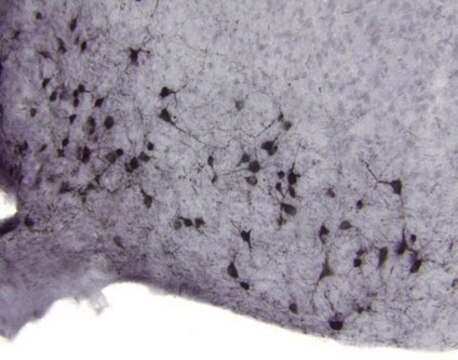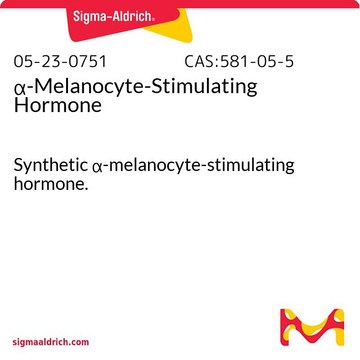M0939
Anti-α-MSH antibody produced in rabbit
IgG fraction of antiserum, buffered aqueous solution
Sinonimo/i:
Anti-α-Melanocyte Stimulating Hormone
About This Item
Prodotti consigliati
Origine biologica
rabbit
Coniugato
unconjugated
Forma dell’anticorpo
IgG fraction of antiserum
Tipo di anticorpo
primary antibodies
Clone
polyclonal
Stato
buffered aqueous solution
PM
antigen 1664.9 kDa
Reattività contro le specie
human
tecniche
ELISA: 1:4,000
microarray: suitable
N° accesso UniProt
Condizioni di spedizione
dry ice
Temperatura di conservazione
−20°C
modifica post-traduzionali bersaglio
unmodified
Informazioni sul gene
human ... POMC(5443)
Categorie correlate
Descrizione generale
Immunogeno
Applicazioni
- immunohistochemistry
- radioimmunoassay/α-MSH immunoassay
- enzyme linked immunosorbent assay (ELISA)
Azioni biochim/fisiol
Stato fisico
Esclusione di responsabilità
Non trovi il prodotto giusto?
Prova il nostro Motore di ricerca dei prodotti.
Codice della classe di stoccaggio
12 - Non Combustible Liquids
Classe di pericolosità dell'acqua (WGK)
WGK 2
Punto d’infiammabilità (°F)
Not applicable
Punto d’infiammabilità (°C)
Not applicable
Scegli una delle versioni più recenti:
Certificati d'analisi (COA)
Non trovi la versione di tuo interesse?
Se hai bisogno di una versione specifica, puoi cercare il certificato tramite il numero di lotto.
Possiedi già questo prodotto?
I documenti relativi ai prodotti acquistati recentemente sono disponibili nell’Archivio dei documenti.
Il team dei nostri ricercatori vanta grande esperienza in tutte le aree della ricerca quali Life Science, scienza dei materiali, sintesi chimica, cromatografia, discipline analitiche, ecc..
Contatta l'Assistenza Tecnica.


![[Nle4, D-Phe7]-α-Melanocyte Stimulating Hormone trifluoroacetate salt ≥95% (HPLC)](/deepweb/assets/sigmaaldrich/product/structures/276/187/9733edf4-6412-4f2b-8cc6-c3f9f3425d4d/640/9733edf4-6412-4f2b-8cc6-c3f9f3425d4d.png)





